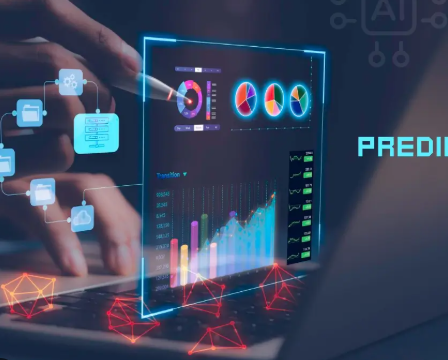In today’s competitive business environment, identifying and converting high-value leads is essential for success. However, the process of lead scoring—determining which leads are most likely to convert into customers—can be complex and time-consuming. This is where AI-driven lead scoring comes into play, providing businesses with the tools to more efficiently and accurately prioritize their prospects.
AI-powered lead scoring leverages machine learning algorithms to analyze historical data, engagement patterns, and behavioral signals to predict which leads are most likely to turn into paying customers. In this article, we’ll explore how AI-driven lead scoring works, its benefits, and how businesses can implement it to enhance their sales and marketing efforts.
1. What is AI-Driven Lead Scoring?
Lead scoring is the process of ranking prospects based on their likelihood of becoming a customer. Traditionally, this has been done manually by sales and marketing teams, who assess each lead’s behavior, demographic information, and engagement. However, with AI-driven lead scoring, businesses can automate this process using algorithms that analyze vast amounts of data and predict the quality of leads more accurately.
AI-driven lead scoring typically combines historical sales data, customer behavior (such as website visits or email opens), demographic information, and even social media activity to generate a score for each lead. The higher the score, the more likely the lead is to convert.
2. How AI-Driven Lead Scoring Works
AI algorithms analyze numerous data points to determine the potential value of a lead. Here’s how the process typically works:
-
Data Collection: AI systems collect data from various sources, such as your CRM, website interactions, email campaigns, social media platforms, and customer feedback.
-
Behavioral Analysis: AI tracks how leads engage with your brand, including actions like downloading whitepapers, attending webinars, or clicking on promotional emails. This helps to understand the lead’s level of interest.
-
Predictive Analytics: Using historical data and machine learning, AI algorithms predict which leads are more likely to convert. For example, if leads with certain behaviors (such as downloading a product brochure) have historically converted at higher rates, the AI system will assign a higher score to similar leads.
-
Scoring and Prioritization: Once the data is analyzed, AI assigns a score to each lead based on their likelihood of becoming a customer. The leads with the highest scores are prioritized for follow-up, helping sales teams focus their efforts on the most promising prospects.
3. Benefits of AI-Driven Lead Scoring
AI-driven lead scoring offers several benefits to businesses looking to streamline their lead qualification process and improve conversion rates:
-
Improved Accuracy: Traditional lead scoring is often based on gut feeling or limited data. AI-driven lead scoring uses vast amounts of data and predictive analytics to make more accurate predictions, increasing the likelihood of closing sales.
-
Time Savings: By automating the lead scoring process, AI saves sales teams time by eliminating the need for manual scoring and helping them focus on high-priority leads. This allows sales teams to spend more time on engaging with prospects and closing deals.
-
Increased Conversion Rates: AI helps identify the leads that are most likely to convert, enabling businesses to tailor their sales and marketing strategies to these high-value prospects. As a result, conversion rates are likely to improve.
-
Better Resource Allocation: AI-driven lead scoring helps businesses allocate resources more effectively. Sales teams can focus their efforts on the leads with the highest potential, while marketing teams can create targeted campaigns for different segments of leads based on their likelihood to convert.
4. How AI Enhances Lead Scoring with Predictive Analytics
Predictive analytics is one of the key components of AI-driven lead scoring. By analyzing historical data, AI can identify patterns that indicate a lead’s likelihood of converting. For example, AI can learn that leads who have previously engaged with specific types of content (e.g., product demos, case studies, or pricing information) are more likely to make a purchase.
Additionally, AI can segment leads based on their behavior and tailor lead scoring models accordingly. For instance, AI may identify that leads who engage with certain products or features are more likely to convert, and therefore, these leads receive higher scores.
By continuously analyzing new data and adjusting the scoring model, AI systems can improve over time, making more accurate predictions as they “learn” from past interactions.
5. Integrating AI-Driven Lead Scoring into Your Sales Strategy
To get the most out of AI-driven lead scoring, it’s important to integrate this technology into your overall sales and marketing strategy. Here’s how you can do this:
-
Use a CRM System with AI Capabilities: Many CRM systems, like Salesforce, HubSpot, and Zoho, offer AI-driven lead scoring as part of their features. By integrating AI with your CRM, you can automatically score leads and prioritize your outreach.
-
Collaborate Between Sales and Marketing Teams: AI-driven lead scoring is most effective when sales and marketing teams collaborate. Marketing teams can use AI to nurture high-scoring leads through targeted campaigns, while sales teams can focus on engaging the most promising prospects.
-
Customize Lead Scoring Models: Not all businesses are the same, and different industries may require different lead scoring models. Customize the AI model to reflect your specific business needs, taking into account unique behaviors and criteria that indicate a high-value lead in your market.
-
Monitor and Refine the AI Model: While AI models are powerful, they are not perfect. Continuously monitor the effectiveness of your lead scoring system, and refine the model as necessary to improve its accuracy and relevance to your business.
6. Challenges to Consider with AI-Driven Lead Scoring
While AI-driven lead scoring offers significant advantages, there are also challenges to keep in mind:
-
Data Quality: The accuracy of AI-driven lead scoring depends on the quality of the data it analyzes. If your data is incomplete, inconsistent, or outdated, the predictions may be inaccurate. It’s essential to maintain clean, up-to-date data to get the best results from AI.
-
Over-Reliance on Automation: AI can streamline lead scoring, but it’s still important to have human oversight. Sales teams should be able to review lead scores and intervene when necessary, especially in cases where human intuition may be required.
-
Complexity of Implementation: Implementing AI-driven lead scoring may require investment in technology and staff training. It’s important to choose the right tools and resources to ensure smooth integration and operation.
Conclusion
AI-driven lead scoring is a game-changer for businesses looking to improve their lead qualification process and boost conversion rates. By leveraging machine learning algorithms and predictive analytics, businesses can more accurately identify high-value prospects, save time, and optimize their sales efforts. As AI technology continues to evolve, integrating it into your sales strategy can provide a significant competitive advantage in today’s fast-paced market.






